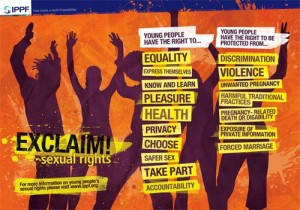 Abortion groups have released a “toolkit” for activists to file “sexual rights” complaints against countries in the UN. International Planned Parenthood Federation (IPPF) and Sexual Rights Initiative (SRI), a coalition of organizations that advocate for sexual and reproductive rights at the United Nations, released the 2012 Sexual Rights toolkit to encourage advocates to document sexual and reproductive right abuses and submit reports to the UN through the Universal Periodic Review (UPR).
Abortion groups have released a “toolkit” for activists to file “sexual rights” complaints against countries in the UN. International Planned Parenthood Federation (IPPF) and Sexual Rights Initiative (SRI), a coalition of organizations that advocate for sexual and reproductive rights at the United Nations, released the 2012 Sexual Rights toolkit to encourage advocates to document sexual and reproductive right abuses and submit reports to the UN through the Universal Periodic Review (UPR).
IPPF and SRI have used the UPR process of the UN Human Rights Council to pressure countries to liberalize policies relating to sexual and reproductive rights. The UPR process was established in 2006 to review human rights conditions of all Member States every four years.
The toolkit was developed for non-governmental organizations and civil society activists to prepare reports on what they consider sexual rights violations in their country. Submissions may come from any “credible” civil society actors, including those not accredited by the UN. They are encouraged to seek allied countries that will take up their cause at the UN. Likely candidates are the Scandinavian and Benelux (Belgium, Netherlands and Luxembourg) countries with some of the world’s most liberal legislation on sexual and reproductive “rights.”
Claiming that sexual rights are human rights, IPPF and SRI are attempting to inject perceived sexual rights abuses into the system that deals with human rights. They believe the “transparency” of the UPR process will further advance sexual rights by providing greater government accountability in “front of a global audience.”
The criteria for sexual rights advocates to engage in their countries UPR is “knowledge or experience of laws and policies that are preventing people from making free and informed decisions on all matters related to sexuality, reproduction and gender.” SRI offers monetary compensation in the form of an honorarium to organizations or individuals in targeted under-developed countries submitting reports of sexual abuse.
Within the context of sexual rights IPPF and SRI also promote comprehensive, rights-based sex education for minors. Calling on governments to “create environments in which children can achieve their optimal capacity” they advocate that young people make their own decisions related to “sexual and reproductive life, including how, when, and with whom they have sex.”
Over the past several years SRI has successfully used the UPR process to “name and shame” states to alter their legislation relating to abortion, homosexuality and other sexual and gender identity issues. Last year SRI and IPPF associations in Thailand submitted a report to the UN Human Rights Council recommending the decriminalization of prostitutes to reduce the stigma associated with prostitution and to obtain healthcare services and sex education for prostitutes and their clients. Finland obligingly made the recommendation. Last October the Irish government was pressured to legalize abortion through a recommendation submitted by Norway.
Criticism of the UN treaty body system and calls for reform by Member States have recently emerged due to treaty body committees overstepping their mandate and pressuring States to change policies on perceived rights that don’t exist in international treaties and protocols.



